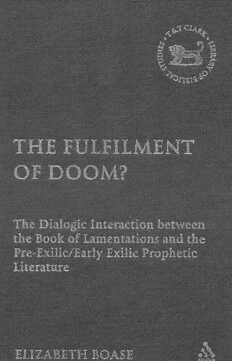
The Fulfilment of Doom?: The Dialogic Interaction between the Book of Lamentations and the Pre-Exilic Early Exilic Prophetic Literature (The Library of Hebrew Bible - Old Testament Studies) PDF
279 Pages·2006·16.188 MB·English
Most books are stored in the elastic cloud where traffic is expensive. For this reason, we have a limit on daily download.
Preview The Fulfilment of Doom?: The Dialogic Interaction between the Book of Lamentations and the Pre-Exilic Early Exilic Prophetic Literature (The Library of Hebrew Bible - Old Testament Studies)
Description:
It has long been noted that the "Book of Lamentations" shares, at least in part, a theological outlook with the prophetic literature that the destruction of Jerusalem was the result of Yahweh's decisive action against the sins of the nation. Too often, however, this relationship has simply been presupposed, or assumed to be a relationship of shared perspective. To date, there has been no systematic exploration of how it is that Lamentations accepts and/or modifies the theological outlook of the prophetic literature. In addition, when the theology of the prophets has been discussed in relation to "Lamentations", there has been a tendency to group all the prophetic books together as if they existed as a homogeneous whole, and shared amongst themselves a singular outlook. This tendency to simplify the theological complexity of the prophetic literature coincides with a similar tendency to reduce the theology of "Lamentations" to simple, monotheistic assertions. Drawing on the literary insights of Mikhail Bakhtin, this study explores in detail the nature of the relationship between "Lamentations" and the pre-exilic/exilic prophetic literature. Drawing on the notions of dialogism, polyphony and double-voicing, the study argues that "Lamentations" enters into a dialogic relationship with prophetic literature, a relationship that both affirms and subverts that literature. Central to the acknowledgement of the dialogic interaction between Lamentations and the prophetic literature is the recognition of "Lamentations" as a multivalent, polyphonic text in which unmerged viewpoints exist in a tension-filled relationship.
See more
The list of books you might like
Most books are stored in the elastic cloud where traffic is expensive. For this reason, we have a limit on daily download.
